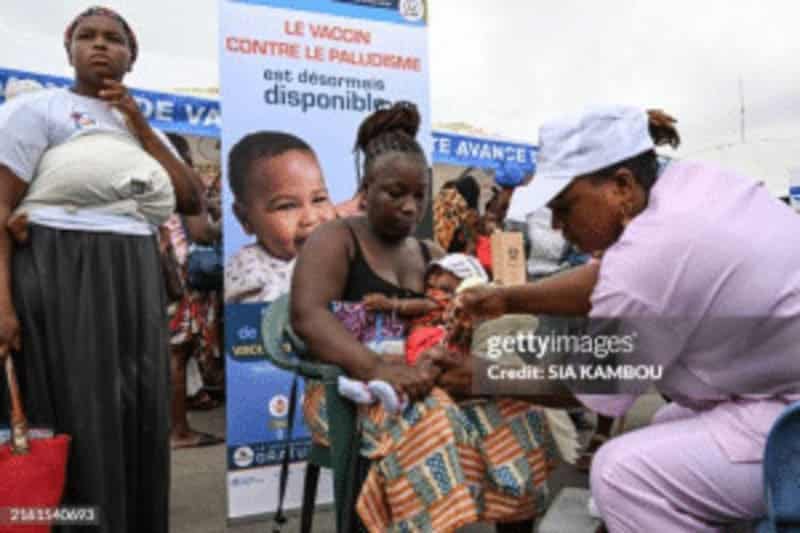Having killed around 608,000 people in 2022 according to the World Health Organization (WHO), malaria remains one of the world’s deadliest diseases. Though this disease is preventable and curable, the availability and cost of vaccines have presented a major obstacle to fighting it; demand for treatment has often outpaced supply. A breakthrough began this year with the release of the inexpensive, highly effective RTS,S and R21 vaccines.
As rates of death for this disease are highest among children under 5 on the African continent, millions of doses of RTS,S and R21 have been distributed to several African nations; healthcare workers in these countries have started to administer these doses to children. By reducing the high rates of malaria infections and deaths among young children, the vaccines will play a major role in curtailing the devastating effects of this disease on both a national and global scale.
How Were The Vaccines Developed?
The RTS,S vaccine was developed by researchers at the British pharmaceutical company GlaxoSmithKline, while the R21/Matrix M vaccine was developed by researchers at the Jenner Institute at the University of Oxford and the Serum Institute of India. A study in February showed that the R21 vaccine prevented around 75% to 80% of symptomatic malaria cases in children within the first year after they received the shots; separate trials showed that the RTS,S vaccine performed similarly.
The WHO approved both R21 and RTS,S for release since they were the first to meet and exceed the organization’s target of 75% efficacy in preventing the disease. According to Oxford professor of vaccinology Sir Adrian Hill, who led the development process for the R21 vaccine, these vaccinations could cut annual malaria-related deaths in half once implemented. He also stated that in the future, they could form part of “a really serious attempt at eliminating and eradicating malaria.”
Where Have They Been Released and Administered to Patients?
Of the 608,000 malaria-related deaths in 2022, 95% of them occurred in Africa and 80% of them occurred among children under 5; around half a million children across the continent die from the disease every year. Due to the disease’s widespread presence on the continent, millions of doses of RTS,S and R21 have already been approved for, shipped to, and administered to children in nations across the continent.
The RTS,S vaccine has already been administered in Cameroon as part of a routine program and delivered to 2 million children in Ghana, Kenya, and Malawi as part of a 4-year pilot program. 656,000 doses of the R21 vaccine have been shipped to Ivory Coast and South Sudan; healthcare workers in Ivory Coast began administering doses to children on July 15, while those in South Sudan began doing so on July 16. Both RTS,S and R21 have also been approved for use in Burkina Faso, Central African Republic, Ghana, and Nigeria.
The Serum Institute of India has already manufactured 25 million doses of R21 and has pledged to produce up to 100 million doses a year. Compared to previous malaria vaccines, which cost around $9 to $10 per dose, this vaccine only costs $4 per dose. The large supply and inexpensive cost of the doses mean that this vaccine will be more readily available for millions across these various nations, many of which are low-income and thus have less access to more expensive treatment options.
How Effective Will They Be At Fighting Malaria?
Designed to be administered in three doses (one at five months of age, one at six, and one at seven) and followed by a booster a year later, the R21 vaccine primes the patient’s blood with antibodies that actively target the circumsporozoite protein (CSP) that causes malaria. According to UNICEF, since its implementation in Ghana, Kenya, and Malawi, the RTS,S vaccine has already reduced all-cause mortality in children by 13%.
According to WHO models, widespread implementation of both of these vaccines could prevent up to 500,000 child deaths caused by malaria a year. Used in conjunction with other prevention strategies like mosquito nets, they are expected to have a major positive impact on public health.
Final Thoughts
One of the world’s most devastating diseases, malaria remains a major cause of death in many nations, especially ones that lack ready access to effective, high-quality vaccines. In recent months, researchers at Oxford University and the Serum Institute of India, the WHO, and pharmaceutical companies have worked together to deliver the inexpensive and highly effective RTS,S and R21 vaccines to several African nations struggling with many cases of child mortality caused by the disease.
Nations including Ghana, Ivory Coast, Kenya, Malawi, and South Sudan have begun administering these vaccines to millions of very young children at risk of contracting the disease. Based on preliminary studies, they will drastically reduce the number of infections and deaths caused by the disease. As these vaccines continue to be produced and administered to millions of children in malaria-stricken regions, they will serve as a major fighting force against the disease.
Disclaimer: This article is intended simply to provide information. It does not replace the medical advice of a physician. Please speak with your doctor if you have any questions or concerns.
For More Great Content
Total Apex is an all-encompassing content producer. We provide heavily detailed articles every day on entertainment, gaming, sports, and so much more! Check out all our great sports content at Total Apex Sports. Check us out on X @TotalApexEandG and our other sites: Total Apex Sports Bets and Total Apex Fantasy Sports.




